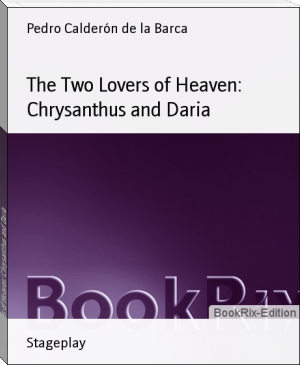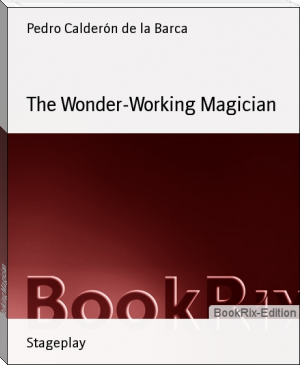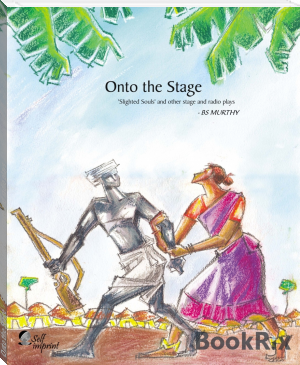The Purgatory of St. Patrick by Pedro Calderón de la Barca (good short books txt) 📖

- Author: Pedro Calderón de la Barca
Book online «The Purgatory of St. Patrick by Pedro Calderón de la Barca (good short books txt) 📖». Author Pedro Calderón de la Barca
[footnote] *See note as to Montalvan's invention of this story.
KING. Luis, though thou art a Christian, Which by me is most detested, Yet I so admire thy courage That I wish, before all present, Between thee and him to show How my power can be exerted, How it punishes as rewards, How it elevates and depresses. And so thus my arms I give thee, That within them thus extended Thou may'st reach my heart; to thee Thus beneath my feet to tread thee; [He throws PATRICK on the ground and places his foot upon him. The two actions signifying How the heavier scale descendeth. And that, Patrick, thou may'st see How I value or give credit To thy threats, thy life I spare. Vomit forth the flame incessant Of the so-called word of God, That by this thou may'st be certain I do not adore his Godship, Nor his miracles have dread of. Live then; but in such a state Of poor, mean, and abject service, As befits a useless hind In the fields; and so as shepherd I would have thee guard my flocks, Which are in these vales collected. Let us see, if for the purpose Of this mystic fire outspreading, Being my slave, thy God will free thee From captivity and thy fetters. [Exit.
LESBIA. Patrick moves my heart to pity. [Exit.
POLONIA. Not so mine, for none I cherish. Had I any, none would move me Sooner than this Luis Enius.* [Exit.
[footnote] *It is difficult to account for Calderon giving the name of "Egerio" to the King of Ireland, when he bestows the proper one - "Leogaire" - on an inferior character. The name of the King of Montalvan. "Era Rey de aquella, y de otras islas comarcanas Leogardo, hijo de Neil." - Cap. I., p. 19, ed. 1628. Calderon had to invent names for the king's daughters, as he did not find them in Montalvan. In the Book of Armagh they are called "Ethne the fair" and "Fedelm the ruddy." - Todd, p. 451. Miss Cusack gives the names "Ethna" and "Fethlema." - "Life of St. Patrick", p. 291. Of their baptism, the distinguished poet to whom this drama is dedicated, has thus sung:-
"They knelt: on their heads the wave he poured Thrice, in the name of the Triune Lord: And their foreheads he signed with the Sign adored. On Fedelm the 'Red Rose,' on Ethna 'The Fair,' God's dew shone bright in that morning air." - AUBREY DE VERE'S "Legends of St. Patrick".
* * * * *
SCENE III.
PATRICK and LUIS.
PATRICK. Luis, though a low position Mine is here, and I observe thee Raised to fortune's highest summit, Yet I feel more grief than envy At thy rise. Thou art a Christian; Show thyself one now in earnest.
LUIS. Patrick, let me now enjoy The first favours fate has sent me After so much sad misfortune.
PATRICK. One word, then (if thou wilt let me So presume), I ask of thee.
LUIS. What is that?
PATRICK. Upon this earth here, Once again, alive or dead, That we two shall meet together.
LUIS. Such a word dost ask me?
PATRICK. Yes.
LUIS. Then I give it.
PATRICK. I accept it. [Exeunt.
* * * * *
SCENE IV.
A HAMLET NEAR THE COURT OF EGERIUS.
PHILIP and LUCY.
LUCY. Pardon, if I have not known How to serve you as I ought.
PHILIP. For much more than you have thought Must you my forgiveness own. For when I your kind face view, Pain and pleasure being at war, I have much to thank you for, And have much to pardon too. Thanks, with which my heart is rife, Are for life restored and breath; Pardon, for you give me death, As before you gave me life.
LUCY. For such flattering declarations Rude and ignorant am I, So my arms will give reply; Which gets rid of explanations. Let their silent interfacing Figure what my words should be.
* * * * *
SCENE V.
PAUL. - THE SAME.
PAUL [aside]. Eh, sirs! what is this I see? Some one here my wife's embracing. What's to do? I burn, I burst. Kill her? Yes. 'Twas fortune sent me. One thing only doth prevent me, Which is, she might kill me first.
PHILIP. For your hospitable care, Beauteous mountaineer, I would That this ring's bright diamond could Far outshine a star of air.
LUCY. Think me not a woman who Lives intent her gain to make; But I take it for your sake.
PAUL. [aside'. What I wonder should I do? But if I'm her husband, then, As I saw him give the ring, Silence is the proper thing.
LUCY. In these arms I once again Give to you my soul, for I Have no other ring or chain.
PHILIP. Where I ever could remain:- For such sweet captivity Lures me from the miseries Of remembering my sad fate, Caused, as you have seen, so late, By these crystalline blue seas.
PAUL [aside[. What! a new embrace! Halloo! Don't you see, sir, Od's my life, That this woman is my wife?
PHILIP. Here's your husband full in view; He has seen us. I must straight Leave you and return - [Aside.} Ah, me! Couldst thou this, Polonia, see, Thou mightst mourn, perhaps, the state Unto which I see me doomed. And. O heaven-aspiring sea, Say in what vast depths can be All the lives thou hast entombed? [Exit.
* * * * *
SCENE VI.
PAUL and LUCY; afterwards PHILIP.
PAUL [aside]. As he's gone, I'll louder speak.- This time, Lucy mine, I've caught you, So a present I have brought you: See this window-bar, 'twill wreak My revenge.
LUCY. Oh, how malicious! Bless me, grumbler, what grimaces!
PAUL. Then to witness two embraces Does not look at all suspicious?- Was it malice, then, in me, Not plain seeing?
LUCY. Malice merely: For a husband, how so nearly He may pry, should never see More than half his wife doth do.
PAUL. Well, with that I'm quite content, To that condition I assent, And since twice embraced by you Has that rascal soldier been, Whom the sea spewed out in spite, I will juggle with my sight, And pretend but once to have seen; And as I for two embraces Meant to give a hundred blows, I but fifty now propose For one half of my disgraces. I have totted up the score; You yourself the sentence gave; Yes, by God I swear, you'll have Fifty strokes and not one more.
LUCY. I've admitted far too much. For a husband it would be Quite preposterous; he should see But the quarter.
PAUL. Even as such I acknowledge the appeal. Patience, and your back prepare, For the now admitted share, Five-and-twenty blows you'll feel.
LUCY. No, not so; you're still astray.
PAUL. Then say what?
LUCY. Between us two, You're to trust not what you view, But what I am pleased to say.
PAUL. Better far, I think, 'twould be, Daughter of the devil, that you Held the stick and used it too, With it well belabouring me; Is't agreed what I propose? Yes; then let us both change places. Give to him the two embraces, And to me the hundred blows.
[PHILIP returns.
PHILIP [aside]. Has the peasant gone, I wonder?
PAUL. At the nick of time you're here, So, Sir Soldier, lend an ear. Obligation I am under For the favours you have meant To bestow so liberally On my cot, my wife, and me; And although I'm well content With you, yet as you're progressing Day by day and getting stronger, It is best you stay no longer. Take the road, then, with God's blessing, Leave my house, for it would be Sad in it to raise my hand, Leaving you dead flesh on land Who wert living fish at sea.
PHILIP. The suspicion that you show Is quite groundless, do not doubt it.
PAUL. Zounds! with reason or without it, Am I married, sir, or no?
* * * * *
SCENE VII.
LEOGAIRE, an Old Peasant, and PATRICK.
LEOGAIRE. So 'tis ordered, and that he Serving here from day to day, In the open field should stay.
OLD MAN. Yes; I say it so shall be.
LEOGAIRE. But who's this? O happiness! Since 'tis Philip's form I greet. Mighty lord, I kiss thy feet.
PAUL. Mighty lord does he call him?
LUCY. Yes. Now lay on the blows you owe. Now, friend Paul, the moment charms.
PHILIP. Give me, good Leogaire, your arms.
LEOGAIRE. Honour in them you bestow. Is it possible, once more That alive I see thee?
PHILIP. Here, Trophy of a fate severe, The sea flung me on this shore, Where, their willing aid secured, I have lived these peasants' guest, Till I could repair with rest All the sufferings I endured. And, besides, I thought with dread On the angry disposition Of the king: for his ambition When has it or
 In literature a drama genre deserves your attention. Dramas are usually called plays. Every person is made up of two parts: good and evil. Due to life circumstances, the human reveals one or another side of his nature. In drama we can see the full range of emotions : it can be love, jealousy, hatred, fear, etc. The best drama books are full of dialogue. This type of drama is one of the oldest forms of storytelling and has existed almost since the beginning of humanity. Drama genre - these are events that involve a lot of people. People most often suffer in this genre, because they are selfish. People always think to themselves first, they want have a benefit.
In literature a drama genre deserves your attention. Dramas are usually called plays. Every person is made up of two parts: good and evil. Due to life circumstances, the human reveals one or another side of his nature. In drama we can see the full range of emotions : it can be love, jealousy, hatred, fear, etc. The best drama books are full of dialogue. This type of drama is one of the oldest forms of storytelling and has existed almost since the beginning of humanity. Drama genre - these are events that involve a lot of people. People most often suffer in this genre, because they are selfish. People always think to themselves first, they want have a benefit.




Comments (0)